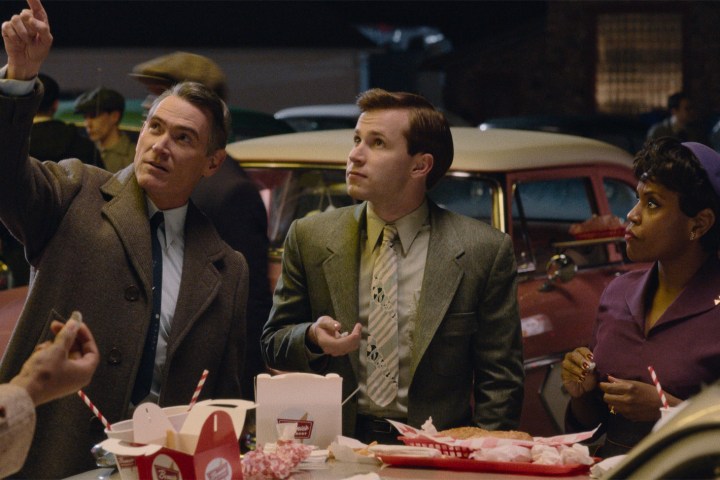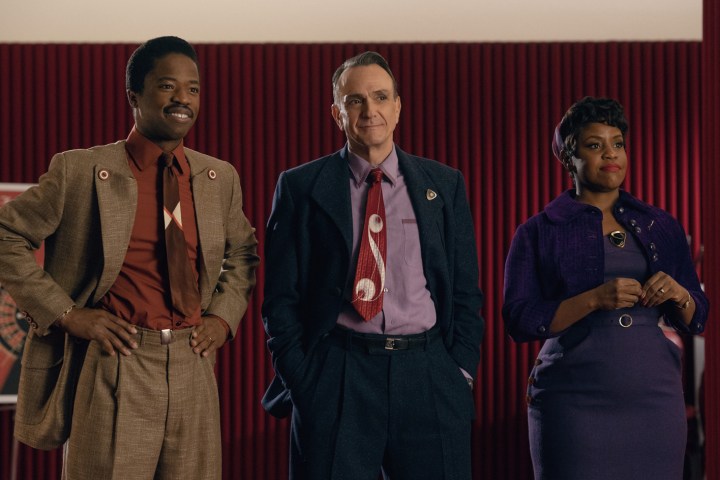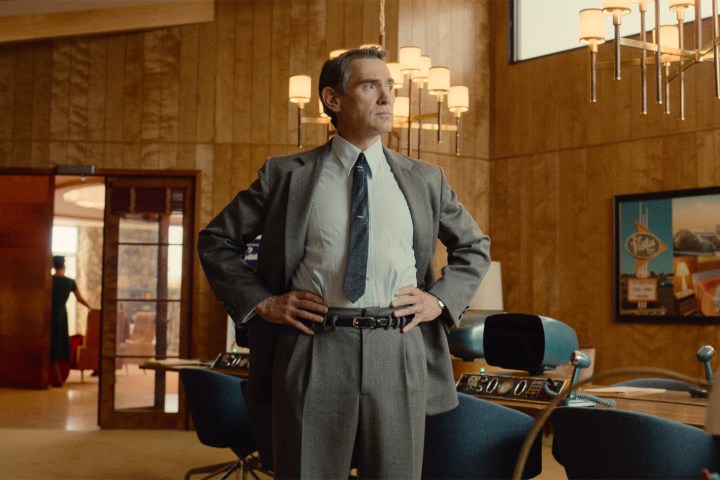Jack Billings is a smooth talker. The opening scene of Apple TV+’s latest sci-fi original series, Hello Tomorrow!, makes that explicitly clear. The traveling salesman (as played by Billy Crudup) has the rare, Don Draper-esque ability to figure out exactly what other people want to hear and convince them that whatever product he’s selling is exactly what they’ve been looking for all along. In the case of Hello Tomorrow! — which takes place in a retrofuturistic alternate reality — that product just so happens to be timeshares in a burgeoning community on the moon.
Jack claims the real estate development, known as “Brightside,” is a place where Earth’s blue-collar workers will be able to go and enjoy the same lunar luxuries that have previously been reserved only for those who are wealthy enough to afford access to them. Of course, most of Jack’s customers see moving to Brightside as a way to escape their problems on Earth, and Crudup’s crude door-to-door salesman knows that. But as is the case with all things that sound too good to be true, there’s more (or less, depending on how you see it) to Brightside than meets the eye.

If that seems like a spoiler, you’ll likely be relieved to know that it actually isn’t. While Hello Tomorrow! does keep the specifics of Jack’s Brightside schemes mysterious for most of its 10-episode first season, the series’ premiere makes it clear that not everything he says about the real estate development is true. Hello Tomorrow! ultimately isn’t all that concerned with how real Brightside is or isn’t, either. The show’s disinterest in such matters is reflective of Jack’s own nonchalance toward the reality of his product.
Jack is a liar, and Hello Tomorrow! — created by Amit Bhalla and Lucas Jansen — wants viewers to know that. But he’s also an intense, unyielding dreamer, one who believes that the promise of a better tomorrow is, in and of itself, a product worth selling. Throughout its first season, Hello Tomorrow! follows Jack as he attempts to convince everyone around him, some of whom are more aware of the reality of his schemes than others, that a lie can become a truth if enough people believe in it.
Hello Tomorrow! is at its best is when it forces Crudup’s Jack to actually grapple with the moral implications of his actions. Unfortunately, most of those moments come in the second half of the series’ first season after the specific details about Brightside have finally been revealed. In the episodes leading up to that reckoning, Hello Tomorrow! does frequently struggle to satisfyingly stretch out its initial mysteries. The series’ first few episodes have a tendency to feel repetitive and slight in a way that will often leave you questioning how much depth actually lurks beneath the surface of its story.

The dramedy’s initial installments spend much of their time focusing on Jack’s relationship with his estranged son, Joey (Nicholas Podany), who doesn’t even recognize his father when he comes into town one day to sell some Brightside timeshares. When Joey expresses an interest in Brightside, Jack sees an opportunity to try and forge an actual relationship with his son, who he brings into his traveling salesman business without initially divulging the true nature of their connection.
Jack’s decision to take Joey on as his mentor presents the opening episodes with plenty of dramatic possibility and tension, but the series’ middle chapters struggle to find new ways to explore and test their relationship. Joey’s never given much characterization outside of his connection to Jack, either, which leaves the character feeling one-note for most of the first season. The same goes for many of Jack’s employees/co-workers, including Hank Azaria’s gambling addict, Eddie, and Dewshane Williams’ overly ambitious Herb, both of whom feel more like caricatures than compelling minor figures.
Of the show’s supporting characters, only Haneefah Wood’s headstrong Shirley makes much of a memorable impression. As one of the few figures in Hello Tomorrow! who is capable of outsmarting Jack, Shirley makes for a compelling and formidable counter to Crudup’s charming schemer. As the focal point around which everything else in the series revolves, Crudup is also reliably magnificent as Jack, a man who genuinely believes that the lies he tells serve a great, admirable purpose. Crudup brings Jack’s moments of weakness and desperation to life with the same unwavering intensity as he does his various, occasionally sermon-like sales pitches.

With directors like Jonathan Entwistle (The End of the F***ing World) and Stacie Passon (Dickinson) on board, Hello Tomorrow! emerges over the course of its first 10 episodes as one of the most visually striking shows of the year. Its retrofuturistic aesthetic allows the Apple TV+ series to combine its recognizable midcentury clothing, furniture, and architecture with its own imaginative sci-fi inventions. From minute details like self-popping popcorn containers and self-tying ties to massive creations like floating cars, Hello Tomorrow! feels at times like a stunningly well-realized live-action iteration of memorable sci-fi cartoons like The Jetsons.
Its visually pleasing look and texture help Hello Tomorrow! stand out further from the rest of TV’s current and recent sci-fi offerings. Its first season is far from perfect and about two episodes too long, but the series is also consistently compelling and well-crafted enough to make watching it a surprisingly easy act. That’s assuming, of course, that viewers are able to look past the fact that, much like its morally dubious protagonist, Hello Tomorrow! is far more shallow than its well-dressed exterior suggests.
Source : Digital Trends


